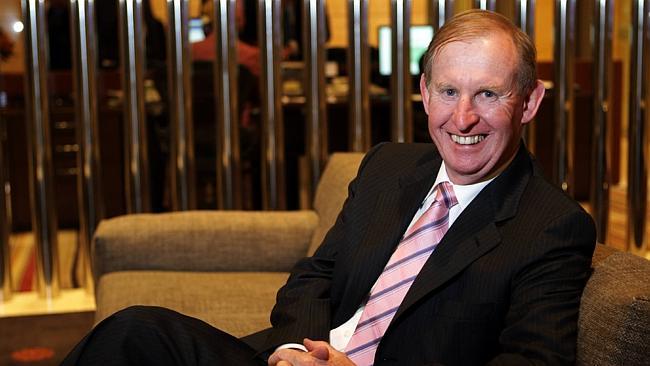Seven issues David Murray needs to sort
THE coming Murray financial system inquiry is gathering pace, chairman David Murray beginning to outline the scope of his powers.

THE forthcoming Murray financial system inquiry is gathering pace, chairman David Murray beginning to outline the scope of his powers.
It’s also dawning on both industry and consumer groups they simply must have a presence at the table, because an exercise of this nature will set the terms of how the investment system works for at least two decades.
I covered and attended (for this newspaper) the last comparable inquiry - the Wallis inquiry in 1996 - which gave us the regulatory system we have today.
Looking back at it, the Wallis inquiry was broadly successful in framing and solving some of the key issues of the time. It’s also worth remembering that in 1996 there were many more banks, superannuation was a fraction of the $1.6 trillion industry it is today - and I don’t recall the internet being mentioned once during the entire inquiry.
Jump to today and we’re looking at an inquiry with wider scope, but one that will face the same innate challenge: The need to offer a genuine balance between what the army of lobbyists from financial institutions desire and what is best for the nation as a whole.
The most immediate example of a parallel exercise - the financial advice regulation review before parliament, which was to be spearheaded by the now sidelined assistant treasurer Arthur Sinodinos - would suggest the financial institution lobbyists are surging towards an easy win. With this history and these related issues in mind - and in no particular order - there are seven outstanding issues investors need to have sorted in the decade ahead, and these should be top priority for the highly capable Murray and his team.
Create competition in the system
IN the first flush or our deregulated financial system, then-treasurer Paul Keating welcomed 16 foreign banks into Australia.
Today, only a handful of foreign banks have any significant presence.
At the time of the Wallis inquiry, there were eight independent regional banks - today there are two. In the wake of the Wallis inquiry, independent non-bank lenders such as the original versions of Aussie Home Loans, RAMS and Wizard, sparked some serious competition in the home-loan market.
Today, the big four banks (including their subsidiaries such as St George, Bankwest and Bank of Melbourne) control more than 80 per cent of the home-lending market and equally unhealthy portions of business lending.
This is a problem from a market perspective, a regulatory perspective and a consumer perspective.
Give us a bond market
THE $90 billion hybrid notes market beloved of banks, corporates and investors alike is not a bond market. It is instead what it says it is - a hybrid.
In turn, that means it is closely correlated to the sharemarket. Hybrids fall when the related shares fall and as a result a generation of investors are using hybrids as bonds, but they are no such thing.
Retail investors with less than $50,000 a pop to spend on individual bonds have nothing else to buy. This is very important because it means more investors are exposed to the stockmarket than meets the eye. On the other side of the equation, it means our big companies, councils and other institutions have few channels to local investors.
Help the nation finance the farm
HERE’S the thing: Australia has the potential to be the breadbasket of Asia, specifically China. Last year, a little known dairy stock, Warrnambool Cheese & Butter, doubled in price as a global takeover battle raged before Canadian Saputo won the day.
But Warrnambool is an outlier. More generally, despite the indisputable opportunities, the agricultural sector is littered with troubled or failed companies: PrimeAg, Burns Philp, AACo.
At the same time, investors are looking to put money into the area if they can find a way. The managed investment scheme framework, which once financed a spectrum of agricultural development from forests to winemakers, has almost completely lost its reputation. It is within the scope of the inquiry to assess and recommend some way to bridge the gap between farmers and investors in an industry that has never in recent decades reached its potential.
Let everyone invest in infrastructure
THERE are parallels here with the gap between the opportunity in farming and the lack of investment pathways.
There are now roughly one million people who are members of DIY super funds. They want reliable yields and infrastructure is the perfect vehicle for this purpose.
At the same time, there are a range of infrastructure projects across the country struggling to get funded.
The terrible history of some recent infrastructure projects - Queensland’s BrisConnections group had what became known as “the float that died of shame” - scared off many private investors from infrastructure projects.
But there was nothing wrong with the Brisbane private road project; the problem was the way banks pushed the envelope on how much risk was placed upon private investors.
Getting a funding framework could literally finance nation-building, it could create jobs and give investors a reliable investment - a triple whammy.
Surely, it can be solved by the powers that be and the talents who are party to this inquiry.
Help for those in need of protection
WHEN the Wallis inquiry reported, it created today’s regulation system: ACCC for competition issues, ASIC for markets supervision, the RBA left in place for core central banking issues and APRA for what was described as the regulation of approved deposit-taking institutions (ADIs) covering the banks and other key financial institutions.
Unfortunately, a swag of financial companies that look like banks and sound like banks, but are not technically ADIs, were left outside. At present they are not sufficiently regulated by any one authority.
It’s this lack of specific regulatory overview that allows scandals to regularly break out among what are best called finance companies where outfits collapse and leave investors high and dry.
This is an area where the least sophisticated consumers - the very ones who need the most protection - get abused. The inquiry needs to seal this gap.
Allow new finance technology to thrive
SOME of the more interesting technology developments are currently hovering at the margins of the financial system.
Just think of the possibility - rather than the current reality - of peer-to-peer lending. (An internet-enabled system that allows lenders and borrowers to transact with each other directly). If peer-to-peer was regulated, borrowers could securely get finance at lower rates and investors could act as lenders, achieving interest rates considerably superior to bank deposits.
Even the notion of a digital currency has serious attractions if we disregard the minefield that currently characterises the bitcoin movement.
How will investors and consumers fare in a financial services arena where companies such as Google are major local players? (Hopefully, better than the tax system has fared, I hear you say).
Don’t soften rules on financial advice
FINALLY, in the specific area of financial advice regulation, we still find ourselves confronted with a commission-ridden industry selling products rather than focusing on advice.
Certainly, recent failings by ASIC in the realm of protecting ordinary consumers when it comes to financial advice, coupled with what seems to be the intense desire of the Abbott government to repeal too much too fast, leaves the gate wide open for further abuses.
The planned rollback of financial advice reforms has already been introduced to parliament, but this legislation can still be halted.
Hopefully, the wide mandate offered to the inquiry will allow Murray and his team to quickly revisit an area where the rush to rid the system of red tape may backfire badly.
James Kirby is managing editor of Eureka Report.
Trial Eureka Report FREE for 21 days. Register now at www.eurekareport.com.au



